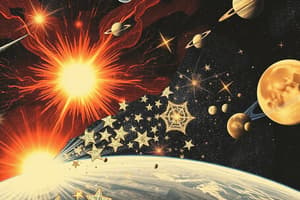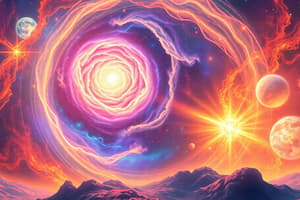Podcast
Questions and Answers
According to the Big Bang theory, how long ago did the universe begin?
According to the Big Bang theory, how long ago did the universe begin?
- Approximately 30 billion years ago
- Approximately 13.8 billion years ago (correct)
- Approximately 20 billion years ago
- Approximately 6.8 billion years ago
Which of the following best describes the rapid expansion of the universe shortly after the Big Bang?
Which of the following best describes the rapid expansion of the universe shortly after the Big Bang?
- Cosmic inflation (correct)
- Cosmic deceleration
- Cosmic contraction
- Cosmic stagnation
According to the Big Bang theory, what is the current state of the universe's expansion?
According to the Big Bang theory, what is the current state of the universe's expansion?
- The universe's expansion is slowing down.
- The universe's expansion is accelerating. (correct)
- The universe's expansion is constant.
- The universe is no longer expanding.
What does the inflation theory attempt to explain?
What does the inflation theory attempt to explain?
What evidence supports the timeline of the Big Bang theory?
What evidence supports the timeline of the Big Bang theory?
According to the inflationary theory, what happened shortly after the Big Bang?
According to the inflationary theory, what happened shortly after the Big Bang?
What did the rapid expansion during cosmic inflation lead to?
What did the rapid expansion during cosmic inflation lead to?
Which of the following observational evidence supports the inflationary scenario?
Which of the following observational evidence supports the inflationary scenario?
How have the large-scale structures formed during inflation evolved over time?
How have the large-scale structures formed during inflation evolved over time?
What is the next step in validating the inflationary theory further?
What is the next step in validating the inflationary theory further?
Study Notes
Big Bang Theory
The Big Bang theory is one of the most widely accepted scientific theories regarding the origin of the universe. It suggests that the universe began as a hot, dense point nearly 13.8 billion years ago and has been expanding ever since. This expansion has resulted in the large-scale structure we observe today, including galaxies, stars, and planets.
Expansion of the Universe
According to the Big Bang theory, the universe expanded rapidly from a very dense state approximately 13.8 billion years ago. This rapid expansion is known as cosmic inflation. During this phase, the scale factor of the universe increased exponentially within a fraction of a second after the Big Bang.
As the universe continued to expand, it cooled down, allowing particles to form and eventually coalesce into larger structures such as atoms, molecules, and galaxies. Observations of the cosmic microwave background radiation support this timeline.
Today, the universe's expansion continues to accelerate due to dark energy, a mysterious force that pushes matter apart at an increasing rate. This accelerating expansion raises questions about the ultimate fate of the universe.
Inflation Theory
Inflation theory is a prediction of the Big Bang theory that explains how small fluctuations in the early universe led to the formation of large-scale structures observed today. According to this theory, the universe underwent a period of extremely rapid expansion called cosmic inflation shortly after the Big Bang.
During inflation, minute variations in the density of matter across the universe were amplified by the exponential growth, leading to the formation of seeds for galaxy clusters, superclusters, voids, and cosmic filaments. These structures have grown over time through gravitational attraction, eventually leading to the large-scale structure we see today.
Observational evidence supporting the inflationary scenario includes the uniformity of the microwave background radiation, which is consistent with a highly homogeneous initial condition. However, more precise measurements from upcoming experiments may help refine our understanding of the primordial conditions and validate the inflation theory further.
Studying That Suits You
Use AI to generate personalized quizzes and flashcards to suit your learning preferences.
Description
Test your knowledge about the Big Bang theory, cosmic inflation, and the expansion of the universe. Learn about the origins of the universe, rapid expansion post-Big Bang, and the formation of large-scale structures in the cosmos.




